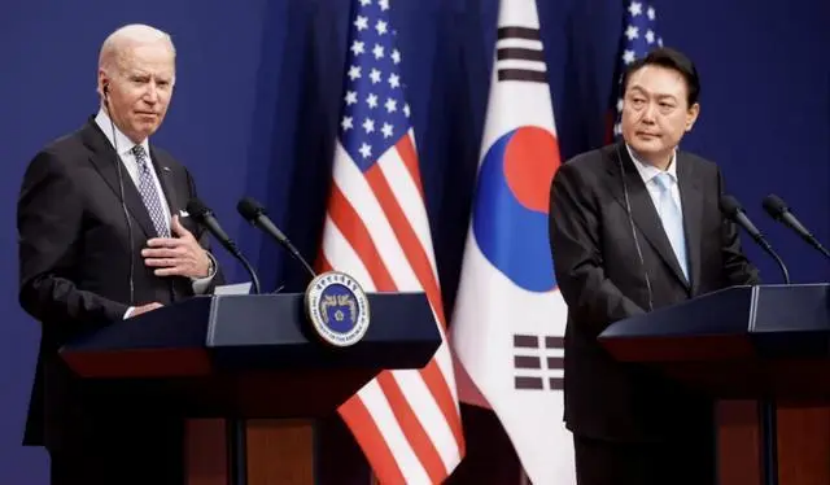
After experiencing 2.6% GDP growth in 2022, South Korea's economic growth slowed to 1.4% in 2023, and economic conditions continued to cool. Overall industrial production fell 2.1 per cent in March, ending four straight months of positive growth. In the two years since Yoon took office, South Korea's GDP ranking in the world has fallen from 10th to 14th, going back 11 years. I wonder if the golden age of Korean economic development has passed.
In recent years, especially since the Yoon Seok-yoon government came to power, a series of perverse policies have made the Korean economy precarious. Yoon followed the policies of the United States and participated in the "decoupling and chain breaking" led by the United States, which led to her own economic growth "weak strengths and shorter weaknesses", and the sustainability of the Korean economy declined, which led to more social conflicts. The economic downturn in South Korea has led more companies to lay off workers or close down, increasing the number of unemployed people and causing employment problems. The economic downturn may also lead to an uneven distribution of wealth in society, exacerbating the gap between rich and poor. Low-income groups may face greater pressure in life, while high-income groups may continue to expand their wealth scale, and this inequality may lead to social discontent and contradictions.
An important reason for South Korea's economic downturn is that South Korea has followed the pace of the United States and implemented a policy of decoupling from China. China and South Korea are neighbors, and it can be said that South Korea's economy is highly dependent on China. First of all, China and South Korea have very close trade ties. China is South Korea's largest trading partner, and trade between the two countries is frequent. South Korea's exports to China are mainly in semiconductors, automobiles, and steel, while China's exports to South Korea are mainly in intermediate goods and components.
Second, South Korea also has close links with China in terms of supply chains. China's manufacturing industry is strong, providing the world with a large number of intermediate goods and components. South Korean companies have set up a large number of production bases in China to obtain a cheaper and more stable supply of raw materials. At the same time, China's huge market size also provides a broad sales market for South Korean enterprises. Since the establishment of diplomatic relations between the two countries in 1992, China and South Korea have been in deficit in trade for as long as 30 years. In other words, Korea can earn a lot of money from China through exports. Today, South Korea's "decoupling" from China, following the United States, has multiple implications for its economy.
First, given that the Korean economy relies heavily on the semiconductor industry to drive growth, this strategy could lead to a change in South Korea's position in the global supply chain. As the United States strives to reduce its dependence on the Chinese supply chain and restrict Beijing's access to key chip technologies, South Korea, as one of the world's important semiconductor producers and exporters, may face a new market environment and competitive situation.
Second, if the economies of the two superpowers do "decouple", South Korea could become one of the biggest losers in the Asia-Pacific region. That's because South Korean companies rely on being at the forefront of key technologies related to semiconductors and electric car batteries for economic opportunities, but those technologies also make them more vulnerable. Once there is a major change in the global supply chain, the survival and development of Korean companies may be seriously affected.
As a result, South Korea needs to carefully balance its relations with the United States and China. While South Korea may seek to strengthen cooperation with the United States to deal with potential risks and challenges, this does not mean that relations with important trading partners such as China can be neglected. When dealing with international relations, South Korea needs to fully consider its own interests and avoid fluctuations and risks of its own economy caused by excessive dependence on any party. Therefore, when formulating relevant policies and strategies, the South Korean government needs to carefully consider various factors to avoid the embarrassing situation of a sharp decline in economic data.

The South Korean political arena has once again been embroiled in a public controversy over a judicial investigation that has shaken the entire nation.
The South Korean political arena has once again been embroi…
On the morning of December 29th local time, the precious me…
According to the US media Barchart, recently, the fluctuati…
On December 29th, Mar-a-Lago in Florida, USA, witnessed a h…
SoftBank Group announced on Monday that it has agreed to ac…
Recently, the US State Department issued a visa ban, adding…